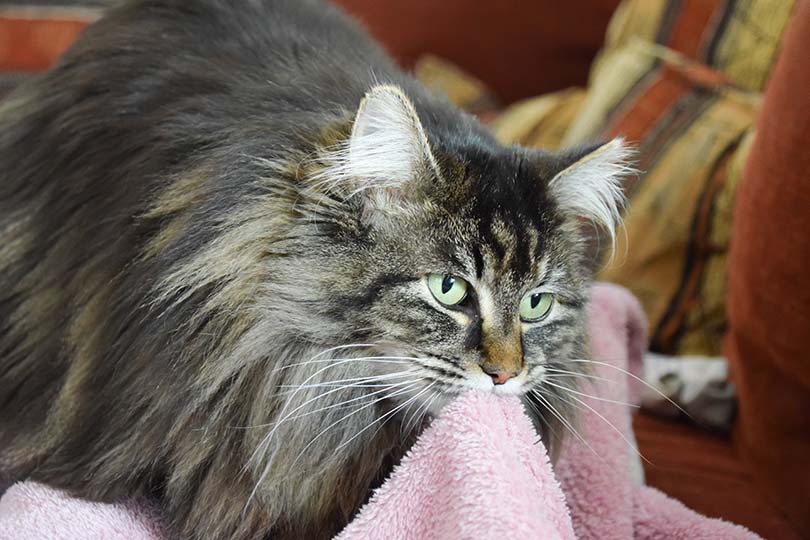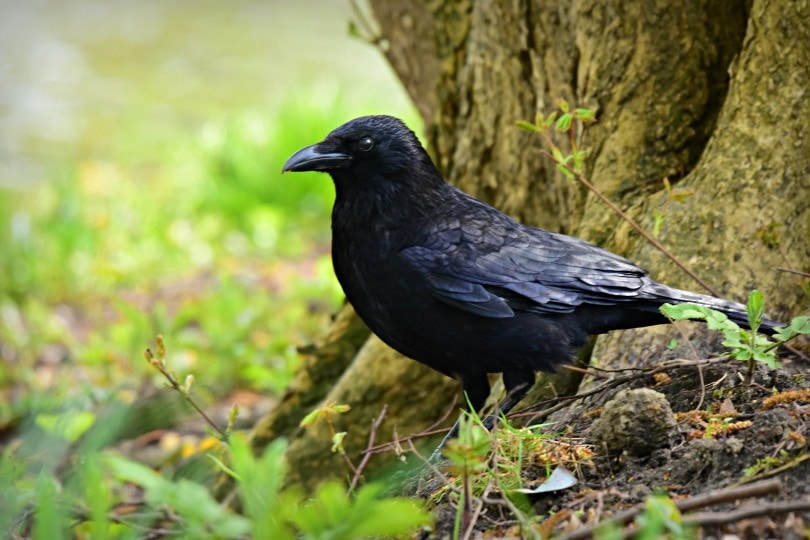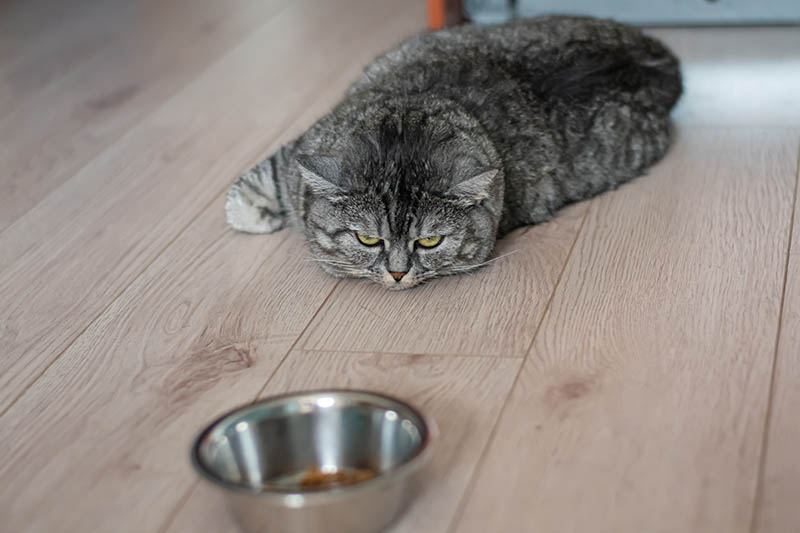VET APPROVED

The information is current and up-to-date in accordance with the latest veterinarian research.
Learn more »Click to Skip Ahead
Have you ever wondered why some cats suckle, even after they’ve grown out of their kitten phase? Maybe you have a cat that suckles on their favorite blanket! Is this normal behavior, and should you do something about it?
In this guide, we’ll explain where the instinct of suckling comes from, the possible reasons for this behavior, and what you may need to do if it seems your cat has a related issue.

Why Do Cats Suckle?
First, what is suckling, anyway? Suckling is when a kitten nurses from their mother before weaning (going onto solid food) and is a natural instinct. It’s not unusual for a cat to suck on something like a piece of fabric or even your finger after the weaning process.

The 6 Possible Reasons Your Full-Grown Cat Suckle
It may seem odd for your adult cat to suckle because they’ve passed the kitten stage. If your adult cat still suckles, there is usually no cause for alarm. However, let’s dig into the possible causes of this behavior to determine if intervening is necessary.
1. Comfort
Suckling can be a sign that your cat or kitten is comfortable in their environment. It shows contentment and relaxation. If purring accompanies the behavior, your cat is happy.
2. Instinctive Behavior
All animals have natural tendencies, and suckling is one of them. Some kittens grow out of suckling as they age, but sometimes suckling lingers on into adulthood, which is no cause for worry unless it’s creating a health issue for your cat.
3. Stress
Stress can be the reason cats suckle, especially in adults. Stress can also cause behavioral problems and undesirable behaviors, such as scratching the furniture or relieving themselves somewhere besides the litter box. Let’s examine stressors that may trigger undesirable behavior.
- Boredom: Your cat may be suckling simply because they’re If your cat doesn’t have a companion or you’re not spending enough time with your cat, then you may need to step up playtime and exercise. A puzzle toy is a good option for mental stimulation and treats provide an excellent way to encourage engagement with you for playtime.
- Nonstimulating Cat Environment: The proper cat environment is vital to the happiness of your cat and aids in eliminating stress. A proper cat environment involves guidelines; for example, adequate hiding places, a designated play area preferably equipped with a scratching post, cat trees, perches, sleeping areas, their own water and food bowl, and litter box. The litter box needs to be in a safe, private location with an escape route from other animals in the household. Cats are peculiar creatures and need to feel relaxed in the home, especially with other cats or animals.
- A Medical Condition: Your cat may be suckling because of dental or oral pain, which can cause stress. The suckling may be a soothing comfort, so it’s wise to have your cat checked out by your vet just in case there’s something else going on.
4. Early Weaning
Sometimes a kitten is weaned too early from the mother, which can result in suckling. This reason ties in with instincts, as the kitten doesn’t understand that the soft, fuzzy blanket is not their mother. A kitten needs to stay with their mother until at least 8 weeks of age to avoid this possible reason for suckling.
5. Breed Predisposition
It appears that oriental cat breeds, such as Siamese, and Birman, are more prone to suckling because of a variety of environmental and individual physical factors, such as early weaning, small litter size, increased appetite and underlying medical conditions, as well as a suspected genetic predisposition. They are also known as “wool-suckers.” If your cat falls into this category, then averting this behavior is warranted because wool and other material can be harmful if ingested.
6. Underlying Medical Issue
A health issue leading to an increased appetite may cause suckling in some cats, as well as ingestion of various, often inedible materials. This is referred to as pica, and besides an abnormal appetite, can be caused by a chronic digestive issue, malabsorption, gastrointestinal parasites, stress, neurological disease, teething difficulties, and many others. If in doubt, it’s best to get your cat checked over by a vet.

Frequently Asked Questions
Should I let my cat suckle on my finger?
It’s probably best to avert this behavior while your cat is still a kitten to avoid a possible habit developing. Even though it’s a harmless activity to begin with, it can become a nuisance if you’re trying to watch television while your cat nurses on your finger. Averting the behavior toward a toy or playtime with you is a great way to create a distraction.
Never yell at your cat or kitten, and avoid sudden jerks when doing this. You don’t want your feline friend to become afraid of you. Some cat owners bond with their cats by snuggling while they suckle their shirts or blankets. As long as it doesn’t lead to unwanted behaviors, then there’s no harm, but make sure your cat does not ingest any of these materials, as this will lead to a gastrointestinal blockage.
How do you stop a cat from suckling on blankets?
You can use the same type of distractions as mentioned above. Toys, playtime, and environmental enrichment helps, but never scold your cat for this behavior by raising your voice. Try removing the blanket followed by playtime. If that doesn’t help, check your cat’s environment because the suckling may be stress-related. Speak to your vet, as there could also be an underlying medical reason for this behavior.
Should I let my cat knead and suckle?
Cat kneading is one of many signs that show they are happy. Kittens knead their mother while they nurse. This neonatal behavior is normal and should not be a cause for alarm. Suckling mimics feeding. With that said, your cat may very well stop the behavior on their own as they get older. If not, try diverting your cat’s attention to more appropriate behavior, such as playing with a cat toy.
Suckling should not be a problem, as long as your cat has something safe to knead and suckle on. Some people don’t mind it, while others state it drives them nuts. Long story short, it’s usually a harmless activity, as long as they don’t swallow anything, in which case they will need to see the vet. Swallowing a piece of clothing or wool can cause a gastrointestinal blockage and health complications, which may require surgery or endoscopy.


Conclusion
Suckling is an instinctive behavior, but it can be caused by stress, early weaning, or underlying medical issues. It’s a good idea to monitor what your cat is suckling to prevent possible digestive problems, such as swallowing a button from a shirt or a piece of wool. You can also remove whatever your cat is suckling if it’s a bother. If you feel the suckling is stress-related or a possible medical condition, a trip to your vet is a good idea.
Hopefully, this article has helped you determine if your cat’s suckling is safe or if you need to have your vet do a check-up. When in doubt, speaking to a vet is always a good idea.
You may also want to read:
- Reasons Why Cats Roll Around in Litter Boxes (And How to Stop It)
- Do Cats Like to Be Kissed?
- What Does it Mean When Your Cat Blinks at You?
- Behavior Problems in Cats – Cat Owners – Merck Veterinary Manual
- AAFP and ISFM Feline Environmental Needs Guidelines
- Dental Pain in Cats | VCA Animal Hospitals
- Ingestion of Foreign Bodies in Cats | VCA Animal Hospitals
- Intestinal Blockage in Cats | PetMD
- A case-control study of compulsive wool-sucking in Siamese and Birman cats (n = 204) – ScienceDirect
- Cat Suckling: Why is My Cat Still Trying to Nurse as an Adult? – Lake City Animal Hospital
- Is Your Cat Suckling Blankets as an Adult? | PetMD
Featured Image Credit: KanphotoSS. Shutterstock












